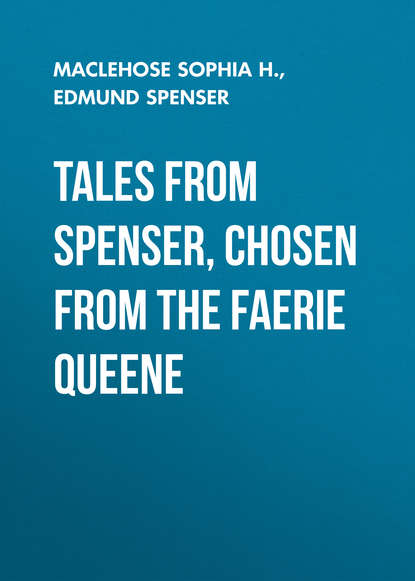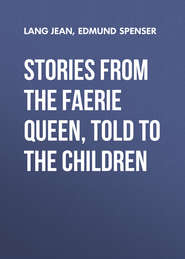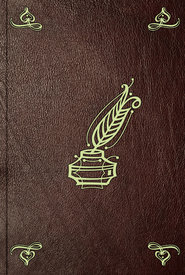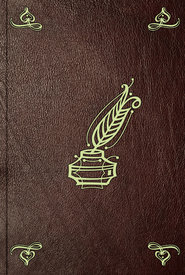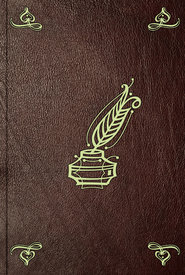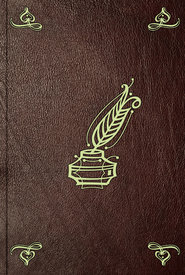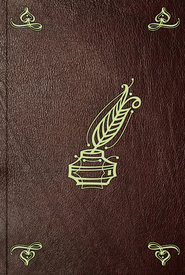По всем вопросам обращайтесь на: info@litportal.ru
(©) 2003-2024.
✖
Tales from Spenser, Chosen from the Faerie Queene
Настройки чтения
Размер шрифта
Высота строк
Поля
As she spoke, the maiden pointed out the tower, and at the same time a hideous roar filled the air with horror. They looked up and beheld the dragon stretched out on the sunny side of a hill. The moment that the monster saw the knight's shining armour, he raised his great frame and hastened towards them as if delighting at the prospect of fresh prey.
Then the knight bade Una leave him and withdraw to a hill at a little distance, where she could watch the fight and yet be secure from danger.
The dreadful beast came on steadily, half walking, half flying in his haste. He covered the ground quickly, and as he went, cast a huge shadow over the wasted land.
As the dragon approached the knight, he reared his monstrous body on high, which looked the more horrible that it was swollen with wrath and venom. It was covered with brazen scales, so closely placed, that nothing could pierce them, and the dragon shook the scales until they sounded like the clashing of armour. He had wings which he spread out like great sails, and when these smote the air, the clouds fled in terror before them, and the heavens stood still in astonishment. His tail was twisted in a hundred folds, and lay over his scaly back, and when he unfolded its coils and displayed its full length, it swept the land behind him for three furlongs. At its extremity were inserted two deadly stings, sharper than the sharpest steel. And still sharper and more cruel were his claws; so cruel and ravenous, that all they touched, and all they drew within their reach, suffered certain destruction.
But most fearful of all was the dragon's head. It had deep-set eyes, that burned with rage, and shone forth like shining shields; and gaping jaws, in which were set three rows of iron teeth. From these trickled the blood of the creatures he had lately devoured, while from between his jaws issued clouds of smoke that filled the air with sulphurous stench.
Such was the foe the Red-cross Knight must face and conquer.
On came the dragon, raising his haughty crest, shaking his scales, and hastening so joyously to the combat, that the knight inwardly quaked for fear.
And now began the first of three days' mortal strife.
The Red-cross Knight couched his spear, and ran fiercely at his foe. The spear did not wound, but it annoyed the dragon: he turned aside, and as he turned, swept both the horse and its rider to the ground. In a moment the knight had risen, and renewed the attack. Never before, although many a knight had fought with him, had the dragon felt such force in the arm of a foe, and yet the deadly thrusts glanced back from his well-armed breast, leaving him unhurt.
But the knight's persistent attacks roused the monster's rage. He spread his great wings, and lifting himself into the air, swooped down upon his foe, and seized both horse and man in his cruel claws. He carried them an arrow's shot, when their fierce struggles obliged him to let them fall; and the knight, putting the force of three men into a single blow, once more aimed his spear at the impenetrable scales. Again the blow glanced aside, but this time it glided close under the dragon's upraised wing, and there inflicted so sore a wound, that the monster, unaccustomed to pain, roared aloud with a noise like that of the ocean in a wintry storm.
The weapon stuck in the dragon's flesh, until he contrived to tear it out with his claws, whereupon black blood streamed forth from his wound, and flames of fire from his nostrils. In his rage, he flung his great tail about: it twisted round the horse's legs, and the steed in its effort to get free, only became the more entangled, and at length was forced to throw the knight. Quickly he arose, and laying hold of his powerful sword, struck the dragon a stroke that seemed as if it must prove fatal. But the hardened iron took little effect upon the still more hardened crest, although it fell with a force that made the dragon careful to avoid its blows.
The knight grew angry when he saw his strokes of no avail, and struck again with greater might, but the steel recoiled, leaving no mark where it had fallen.
Now the dragon was suffering from the wound under his wing, and impatient of the pain, tried again to rise into the air. But the injured wing impeded his effort, and full of rage and disappointment, he uttered a roar such as had never before been heard, and once more sent out flames of fire. These came right into the face of the knight, and making their way through his armour, burned him so sorely that he could hardly endure its weight. Faint and weary, burned, and sore with his wounds, worn out with heat and toil, and the very arms he bore, death seemed to him much easier than life. "But death will never come when needs require," and his despair well nigh cost him dear.
The dragon, seeing his discomfiture, turned upon him, and smiting him with his tail, felled him to the ground. Very near, then, was the knight to the death he coveted.
However, it so happened that, unknown to him, a well of rare virtue lay close by. Its waters could cure sicknesses, make the aged young, wash sinful crimes away, and even restore the dead to life. In the happy days before the accursed dragon had brought ruin to the land, it had been called the Well of Life; and though he had denied its sacred waters with innocent blood, it still retained many of its ancient virtues. Into this spring the knight fell.
And now the sun began to set, and Una, watching from her hill, saw her champion fall, and saw, too, that the monster swelled out his proud breast, and clapped his great wings as if in victory. Little knowing the boon that had befallen her knight, the maiden grew very sad at heart, thinking all was lost. No sleep was possible to her. With folded hands, on lowly knees, she spent the long anxious hours in earnest prayer.
When morning came, Una arose and looked anxiously around to see if, haply, she might discover the warrior still alive, for with the morning new hopes frequently arise. By-and-bye, to her great joy, she saw him start up, all fresh and invigorated by the powers of the wondrous well. The dragon was confounded at the sight, and knew not whether this was his foe of yesterday, or another come to take his place, when the knight uplifted his bright blade, and struck the monster a blow upon the skull, which wounded him in right earnest.
Whether the sword had received some secret virtue from the waters of the well, or whether they had only increased the strength of the knight's right arm, none can tell, but never before had a blow taken such effect on the cruel monster. He yelled aloud as if he were a hundred lions all in one; he tossed his great tail aloft, and scourged the air into a tempest, and flung about its mighty length, so that it overthrew high trees, and tore rocks into pieces. Then advancing his tail high above his head, the dragon struck the knight and smote him to the ground. The cruel sting pierced through his shield and fixed itself in his shoulder. There it remained, causing him very severe pain.
The knight was nearly overcome, but more mindful of the issues involved in the combat than of his own suffering, he rose and tried to free himself. Unable to loose the sting, and inflamed with wrath and anguish, he struck the dragon on the tail, and at one blow cut off five of the mighty joints. Deeply enraged, the creature thought to avenge himself once for all, and gathering himself up, fell fiercely on the knight's shield, and kept fast hold of it.
And now was the Red-cross Knight terribly encumbered. Three times he strove to release his shield from the dragon's clutch, and three times failed. In despair he summoned his trusty sword to his aid, and laid about with it so ruthlessly that at length the creature was forced to withdraw one foot in order to defend himself. Then the knight directed all his blows against the other foot, still fast fixed on the shield, until, by happy fortune, the sword fell upon the ankle-joint, and severed it.
Upon this there burst forth from the beast such smoke and flames and brimstone as to dim the light of heaven itself and force the warrior to retreat, lest he should be scorched alive. As he did so, his weary feet slipped, and he fell down, sore terrified with the dread of shame.
Now it chanced that close by where he fell, there grew a goodly tree, laden with apples. Great virtue had belonged to this tree, and even now there trickled forth from it a stream of balm that fell on the ground and watered it as if with dew. This little stream imparted life and long health to all whom it benefited, and into its soothing power the knight fell, on this, the close of the second day's fight.
Once more his life was saved, for the dragon, who was of death and darkness, dared not approach aught life-giving. And now the daylight began to fade, and Una, seeing her lord again fall and lie motionless, knowing not that he lay in the healing balm, was once more stricken with sore affright, and watched and prayed for him all through the weary darkness.
When morning again dawned Una saw her knight arise, healed and refreshed, ready for renewed combat. And the dragon, who had lain waiting for the day that he might destroy him, grew afraid when he beheld his foe as fresh as if he had not fought at all. Nevertheless, he advanced, full of his wonted pride and rage, with jaws wide open, thinking to devour his foe at the first encounter.
But the knight was prepared to meet him; thrusting his keen weapon between the monster's open jaws, he ran it through his mouth, and wounded him with a mortal wound. Then the dragon fell, and as he fell the earth groaned as if unable to support his weight. And the valiant knight himself trembled, so huge and hideous did the slain dragon look.
Una, who had seen all from her hill, dared not at first approach; but at length finding that the huge mass made no movement, she shook off her terror, and, drawing near, saw that the terrible monster was indeed dead. Then praising God, she thanked her brave champion for the great deliverance.
The sun had scarcely risen above the eastern horizon, when the watchman who stood on the battlements of the brazen tower, saw the last breath of the monster fade away, and knowing then that the dragon was dead, shouted out the glad tidings.
The king heard the shout, and rose in joyful haste, although for his feebleness he could not make much speed, and looked forth to see if the tidings were indeed true. When he found that they were, he commanded the brazen gate, long closed, to be thrown open, and peace and joy to be proclaimed throughout the land – for the dragon was slain! Then the trumpets sounded the happy victory, and the people, with one accord, assembled as in solemn festival, to rejoice over the fall of the great and terrible beast.
From the tower came forth the king and queen, clad in worn and sober garments. Grave nobles attended them, and a band of young men, bearing laurel boughs, followed in glad procession. Headed by the king these made their way to the Red-cross Knight, and, prostrating themselves before him, loudly proclaimed him their lord and patron, casting the laurels at his feet.
As they did so, there issued from the brazen gate maidens adorned with garlands, bearing sweet-sounding timbrels, and dancing as they went; while with them were children who sang to the maidens' music.
This second procession wended its way until it came where Una stood, and there they stayed and sang aloud her praises, and set a green garland on her head, crowning her "'twixt earnest and 'twixt game."
Last of all came the mob, hurrying to see the dragon-slayer, whom they looked upon as sent from heaven, and at whom they stared with gaping wonder. But when they arrived where lay the dead dragon they were filled with fear. Some, indeed, were so terrified that they fled away; others pretended to conceal their fear, while one who wished to be thought wiser than all the rest, suggested that the dragon might not be really dead. At this another immediately declared that he could see fire sparkle in his eye, while a third was persuaded he had seen the monster wink. Others, more bold, stood near its carcase, in order to measure how many acres it covered.
Thus the people flocked about the dead dragon, while the king and his train were entertaining the knight with gifts of ivory and gold. After thanking him a thousand times, and embracing their fair daughter Una, the king and queen conducted them to the palace, while the people strewed the way with their garments and shouted aloud for joy.
Now when the Red-cross Knight had rested and been feasted, the king and queen called upon him to relate the story of his adventures. Tears ran down their cheeks as they listened, and when he had ended, the king again welcomed him to the palace, and spoke of his resting there from all further toil.
But the knight declared that he might not rest yet, for he was bound by vow to Gloriana, Queen of Faeryland, to return and serve her for the space of six years. Then the king called for Una, his only daughter and sole heir, and with his own hands betrothed her to the knight.
Never in all her loveliness had Una looked so fair as when her father called her forth. The toil of the journey over, she had put aside her sober mournful robe, and was arrayed in a dress of pure and shining white, while the brightness of her beautiful countenance astonished even her own true lord. There was great joy among both old and young at the marriage, and a solemn feast was ordered throughout the land.
The Red-cross Knight held himself a thrice happy man, and ever as he looked on his dear lady rejoiced anew. In great peace and happiness he remained with Una until his conscience and his vow compelled him to return for a time to the court of Gloriana, leaving her in her dear parent's care.
After this he was no longer known as the Red-cross Knight, but as St. George, the slayer of the dragon – the great Saint George whom England has made her patron saint.
Britomart and the Magic Mirror
Faerie Queene. Book III. Cantos II., III
Once upon a time there lived in Cambria a king whose name was Ryence. Now Ryence was a good king, and dealt justly with his people, and on this account he won the approval of Merlin, the great magician. And Merlin gave King Ryence a boon.
This boon was a looking-glass, so wonderfully made, and possessed of such strange properties, that its fame spread throughout the wide world. The glass was round, shaped like a ball, and hollow inside. He who looked into it, saw not himself, but saw there portrayed anything that was happening in any part of the world that might be of consequence to him. If a foe were working him secret ill, or a friend feigning false kindness, this glass revealed their deeds. Such, then, was the boon which Merlin had given to King Ryence; and from it the king could learn the approach of an enemy more surely and more quickly than from the swiftest messenger.
Now the King of Cambria had one only child. This was Britomart, his daughter and his heir. She was a noble damsel, tall and stately, with rich golden hair, which, when loosened from its silken bands, fell like a sunny shower, reaching down to her feet. And she was brave as she was beautiful: gentle towards the weak, and ready to help those in trouble; one who scorned to take advantage of the misfortunes of others. A fit daughter of a great king, from whom her father kept no secrets.
It chanced that one day, as Britomart was wandering over the palace, she found herself in the small apartment where Ryence kept the mirror. Forgetful of its strange virtues, the princess looked into it, and was surprised that she did not see a reflection of herself. Then she remembered that Merlin's gift was no ordinary looking-glass, and as she recalled its properties, she began to wonder what she might look for there that was of importance to herself. Standing lingering by the mirror, her thoughts fell on love, and she wondered – as maidens will – whom fortune would allot for her husband.
Now Britomart was no foolish maiden, dwelling ever on her future, and in it forgetting the duties of the present; but she was a rich and lovely princess, and it was only natural that she should expect to marry some day.
By-and-bye, as she gazed into the mirror, there appeared before her the image of a knight, completely armed. His countenance was a right manly one; a countenance to awe his foes, but to endear him to his friends. His frame was large and strong, its natural strength increased by deeds of chivalry which he continually practised. His armour was massive, and seemed of some antique mould, as indeed it was, for in golden letters there was written on it these words —
"Achilles' arms which Artegal did win."
Artegal's crest was a hound couchant, and on his shield he bore the figure of a crowned ermine on an azure field.
As Britomart looked on the image, she liked it, and having looked at it well, she went her way, and little thought that Cupid, the false archer, had shot an arrow into her heart. After a time, the stately Britomart began to droop. She no longer moved about with her customary princely bearing, but became sad, low-spirited, and full of foolish fears; nor could she discover the cause of her discomfiture. At night when she lay down to sleep, Glaucé, the old nurse who still attended her, wondered at her wakefulness, and at the tears which Britomart tried in vain to conceal. And when sleep visited her weary eyes, it was only for a few minutes at a time, and she started in her sleep as if some ghastly dream had affrighted her. She did not know that she loved, but her thoughts ever returned to the fair image she had seen.
One night when Britomart seemed more uneasy than usual, Glaucé determined to inquire into the cause of her unrest. With loving words she besought the princess to tell her how it was that her former cheerfulness had changed into this sad melancholy.
Then the knight bade Una leave him and withdraw to a hill at a little distance, where she could watch the fight and yet be secure from danger.
The dreadful beast came on steadily, half walking, half flying in his haste. He covered the ground quickly, and as he went, cast a huge shadow over the wasted land.
As the dragon approached the knight, he reared his monstrous body on high, which looked the more horrible that it was swollen with wrath and venom. It was covered with brazen scales, so closely placed, that nothing could pierce them, and the dragon shook the scales until they sounded like the clashing of armour. He had wings which he spread out like great sails, and when these smote the air, the clouds fled in terror before them, and the heavens stood still in astonishment. His tail was twisted in a hundred folds, and lay over his scaly back, and when he unfolded its coils and displayed its full length, it swept the land behind him for three furlongs. At its extremity were inserted two deadly stings, sharper than the sharpest steel. And still sharper and more cruel were his claws; so cruel and ravenous, that all they touched, and all they drew within their reach, suffered certain destruction.
But most fearful of all was the dragon's head. It had deep-set eyes, that burned with rage, and shone forth like shining shields; and gaping jaws, in which were set three rows of iron teeth. From these trickled the blood of the creatures he had lately devoured, while from between his jaws issued clouds of smoke that filled the air with sulphurous stench.
Such was the foe the Red-cross Knight must face and conquer.
On came the dragon, raising his haughty crest, shaking his scales, and hastening so joyously to the combat, that the knight inwardly quaked for fear.
And now began the first of three days' mortal strife.
The Red-cross Knight couched his spear, and ran fiercely at his foe. The spear did not wound, but it annoyed the dragon: he turned aside, and as he turned, swept both the horse and its rider to the ground. In a moment the knight had risen, and renewed the attack. Never before, although many a knight had fought with him, had the dragon felt such force in the arm of a foe, and yet the deadly thrusts glanced back from his well-armed breast, leaving him unhurt.
But the knight's persistent attacks roused the monster's rage. He spread his great wings, and lifting himself into the air, swooped down upon his foe, and seized both horse and man in his cruel claws. He carried them an arrow's shot, when their fierce struggles obliged him to let them fall; and the knight, putting the force of three men into a single blow, once more aimed his spear at the impenetrable scales. Again the blow glanced aside, but this time it glided close under the dragon's upraised wing, and there inflicted so sore a wound, that the monster, unaccustomed to pain, roared aloud with a noise like that of the ocean in a wintry storm.
The weapon stuck in the dragon's flesh, until he contrived to tear it out with his claws, whereupon black blood streamed forth from his wound, and flames of fire from his nostrils. In his rage, he flung his great tail about: it twisted round the horse's legs, and the steed in its effort to get free, only became the more entangled, and at length was forced to throw the knight. Quickly he arose, and laying hold of his powerful sword, struck the dragon a stroke that seemed as if it must prove fatal. But the hardened iron took little effect upon the still more hardened crest, although it fell with a force that made the dragon careful to avoid its blows.
The knight grew angry when he saw his strokes of no avail, and struck again with greater might, but the steel recoiled, leaving no mark where it had fallen.
Now the dragon was suffering from the wound under his wing, and impatient of the pain, tried again to rise into the air. But the injured wing impeded his effort, and full of rage and disappointment, he uttered a roar such as had never before been heard, and once more sent out flames of fire. These came right into the face of the knight, and making their way through his armour, burned him so sorely that he could hardly endure its weight. Faint and weary, burned, and sore with his wounds, worn out with heat and toil, and the very arms he bore, death seemed to him much easier than life. "But death will never come when needs require," and his despair well nigh cost him dear.
The dragon, seeing his discomfiture, turned upon him, and smiting him with his tail, felled him to the ground. Very near, then, was the knight to the death he coveted.
However, it so happened that, unknown to him, a well of rare virtue lay close by. Its waters could cure sicknesses, make the aged young, wash sinful crimes away, and even restore the dead to life. In the happy days before the accursed dragon had brought ruin to the land, it had been called the Well of Life; and though he had denied its sacred waters with innocent blood, it still retained many of its ancient virtues. Into this spring the knight fell.
And now the sun began to set, and Una, watching from her hill, saw her champion fall, and saw, too, that the monster swelled out his proud breast, and clapped his great wings as if in victory. Little knowing the boon that had befallen her knight, the maiden grew very sad at heart, thinking all was lost. No sleep was possible to her. With folded hands, on lowly knees, she spent the long anxious hours in earnest prayer.
When morning came, Una arose and looked anxiously around to see if, haply, she might discover the warrior still alive, for with the morning new hopes frequently arise. By-and-bye, to her great joy, she saw him start up, all fresh and invigorated by the powers of the wondrous well. The dragon was confounded at the sight, and knew not whether this was his foe of yesterday, or another come to take his place, when the knight uplifted his bright blade, and struck the monster a blow upon the skull, which wounded him in right earnest.
Whether the sword had received some secret virtue from the waters of the well, or whether they had only increased the strength of the knight's right arm, none can tell, but never before had a blow taken such effect on the cruel monster. He yelled aloud as if he were a hundred lions all in one; he tossed his great tail aloft, and scourged the air into a tempest, and flung about its mighty length, so that it overthrew high trees, and tore rocks into pieces. Then advancing his tail high above his head, the dragon struck the knight and smote him to the ground. The cruel sting pierced through his shield and fixed itself in his shoulder. There it remained, causing him very severe pain.
The knight was nearly overcome, but more mindful of the issues involved in the combat than of his own suffering, he rose and tried to free himself. Unable to loose the sting, and inflamed with wrath and anguish, he struck the dragon on the tail, and at one blow cut off five of the mighty joints. Deeply enraged, the creature thought to avenge himself once for all, and gathering himself up, fell fiercely on the knight's shield, and kept fast hold of it.
And now was the Red-cross Knight terribly encumbered. Three times he strove to release his shield from the dragon's clutch, and three times failed. In despair he summoned his trusty sword to his aid, and laid about with it so ruthlessly that at length the creature was forced to withdraw one foot in order to defend himself. Then the knight directed all his blows against the other foot, still fast fixed on the shield, until, by happy fortune, the sword fell upon the ankle-joint, and severed it.
Upon this there burst forth from the beast such smoke and flames and brimstone as to dim the light of heaven itself and force the warrior to retreat, lest he should be scorched alive. As he did so, his weary feet slipped, and he fell down, sore terrified with the dread of shame.
Now it chanced that close by where he fell, there grew a goodly tree, laden with apples. Great virtue had belonged to this tree, and even now there trickled forth from it a stream of balm that fell on the ground and watered it as if with dew. This little stream imparted life and long health to all whom it benefited, and into its soothing power the knight fell, on this, the close of the second day's fight.
Once more his life was saved, for the dragon, who was of death and darkness, dared not approach aught life-giving. And now the daylight began to fade, and Una, seeing her lord again fall and lie motionless, knowing not that he lay in the healing balm, was once more stricken with sore affright, and watched and prayed for him all through the weary darkness.
When morning again dawned Una saw her knight arise, healed and refreshed, ready for renewed combat. And the dragon, who had lain waiting for the day that he might destroy him, grew afraid when he beheld his foe as fresh as if he had not fought at all. Nevertheless, he advanced, full of his wonted pride and rage, with jaws wide open, thinking to devour his foe at the first encounter.
But the knight was prepared to meet him; thrusting his keen weapon between the monster's open jaws, he ran it through his mouth, and wounded him with a mortal wound. Then the dragon fell, and as he fell the earth groaned as if unable to support his weight. And the valiant knight himself trembled, so huge and hideous did the slain dragon look.
Una, who had seen all from her hill, dared not at first approach; but at length finding that the huge mass made no movement, she shook off her terror, and, drawing near, saw that the terrible monster was indeed dead. Then praising God, she thanked her brave champion for the great deliverance.
The sun had scarcely risen above the eastern horizon, when the watchman who stood on the battlements of the brazen tower, saw the last breath of the monster fade away, and knowing then that the dragon was dead, shouted out the glad tidings.
The king heard the shout, and rose in joyful haste, although for his feebleness he could not make much speed, and looked forth to see if the tidings were indeed true. When he found that they were, he commanded the brazen gate, long closed, to be thrown open, and peace and joy to be proclaimed throughout the land – for the dragon was slain! Then the trumpets sounded the happy victory, and the people, with one accord, assembled as in solemn festival, to rejoice over the fall of the great and terrible beast.
From the tower came forth the king and queen, clad in worn and sober garments. Grave nobles attended them, and a band of young men, bearing laurel boughs, followed in glad procession. Headed by the king these made their way to the Red-cross Knight, and, prostrating themselves before him, loudly proclaimed him their lord and patron, casting the laurels at his feet.
As they did so, there issued from the brazen gate maidens adorned with garlands, bearing sweet-sounding timbrels, and dancing as they went; while with them were children who sang to the maidens' music.
This second procession wended its way until it came where Una stood, and there they stayed and sang aloud her praises, and set a green garland on her head, crowning her "'twixt earnest and 'twixt game."
Last of all came the mob, hurrying to see the dragon-slayer, whom they looked upon as sent from heaven, and at whom they stared with gaping wonder. But when they arrived where lay the dead dragon they were filled with fear. Some, indeed, were so terrified that they fled away; others pretended to conceal their fear, while one who wished to be thought wiser than all the rest, suggested that the dragon might not be really dead. At this another immediately declared that he could see fire sparkle in his eye, while a third was persuaded he had seen the monster wink. Others, more bold, stood near its carcase, in order to measure how many acres it covered.
Thus the people flocked about the dead dragon, while the king and his train were entertaining the knight with gifts of ivory and gold. After thanking him a thousand times, and embracing their fair daughter Una, the king and queen conducted them to the palace, while the people strewed the way with their garments and shouted aloud for joy.
Now when the Red-cross Knight had rested and been feasted, the king and queen called upon him to relate the story of his adventures. Tears ran down their cheeks as they listened, and when he had ended, the king again welcomed him to the palace, and spoke of his resting there from all further toil.
But the knight declared that he might not rest yet, for he was bound by vow to Gloriana, Queen of Faeryland, to return and serve her for the space of six years. Then the king called for Una, his only daughter and sole heir, and with his own hands betrothed her to the knight.
Never in all her loveliness had Una looked so fair as when her father called her forth. The toil of the journey over, she had put aside her sober mournful robe, and was arrayed in a dress of pure and shining white, while the brightness of her beautiful countenance astonished even her own true lord. There was great joy among both old and young at the marriage, and a solemn feast was ordered throughout the land.
The Red-cross Knight held himself a thrice happy man, and ever as he looked on his dear lady rejoiced anew. In great peace and happiness he remained with Una until his conscience and his vow compelled him to return for a time to the court of Gloriana, leaving her in her dear parent's care.
After this he was no longer known as the Red-cross Knight, but as St. George, the slayer of the dragon – the great Saint George whom England has made her patron saint.
Britomart and the Magic Mirror
Faerie Queene. Book III. Cantos II., III
Once upon a time there lived in Cambria a king whose name was Ryence. Now Ryence was a good king, and dealt justly with his people, and on this account he won the approval of Merlin, the great magician. And Merlin gave King Ryence a boon.
This boon was a looking-glass, so wonderfully made, and possessed of such strange properties, that its fame spread throughout the wide world. The glass was round, shaped like a ball, and hollow inside. He who looked into it, saw not himself, but saw there portrayed anything that was happening in any part of the world that might be of consequence to him. If a foe were working him secret ill, or a friend feigning false kindness, this glass revealed their deeds. Such, then, was the boon which Merlin had given to King Ryence; and from it the king could learn the approach of an enemy more surely and more quickly than from the swiftest messenger.
Now the King of Cambria had one only child. This was Britomart, his daughter and his heir. She was a noble damsel, tall and stately, with rich golden hair, which, when loosened from its silken bands, fell like a sunny shower, reaching down to her feet. And she was brave as she was beautiful: gentle towards the weak, and ready to help those in trouble; one who scorned to take advantage of the misfortunes of others. A fit daughter of a great king, from whom her father kept no secrets.
It chanced that one day, as Britomart was wandering over the palace, she found herself in the small apartment where Ryence kept the mirror. Forgetful of its strange virtues, the princess looked into it, and was surprised that she did not see a reflection of herself. Then she remembered that Merlin's gift was no ordinary looking-glass, and as she recalled its properties, she began to wonder what she might look for there that was of importance to herself. Standing lingering by the mirror, her thoughts fell on love, and she wondered – as maidens will – whom fortune would allot for her husband.
Now Britomart was no foolish maiden, dwelling ever on her future, and in it forgetting the duties of the present; but she was a rich and lovely princess, and it was only natural that she should expect to marry some day.
By-and-bye, as she gazed into the mirror, there appeared before her the image of a knight, completely armed. His countenance was a right manly one; a countenance to awe his foes, but to endear him to his friends. His frame was large and strong, its natural strength increased by deeds of chivalry which he continually practised. His armour was massive, and seemed of some antique mould, as indeed it was, for in golden letters there was written on it these words —
"Achilles' arms which Artegal did win."
Artegal's crest was a hound couchant, and on his shield he bore the figure of a crowned ermine on an azure field.
As Britomart looked on the image, she liked it, and having looked at it well, she went her way, and little thought that Cupid, the false archer, had shot an arrow into her heart. After a time, the stately Britomart began to droop. She no longer moved about with her customary princely bearing, but became sad, low-spirited, and full of foolish fears; nor could she discover the cause of her discomfiture. At night when she lay down to sleep, Glaucé, the old nurse who still attended her, wondered at her wakefulness, and at the tears which Britomart tried in vain to conceal. And when sleep visited her weary eyes, it was only for a few minutes at a time, and she started in her sleep as if some ghastly dream had affrighted her. She did not know that she loved, but her thoughts ever returned to the fair image she had seen.
One night when Britomart seemed more uneasy than usual, Glaucé determined to inquire into the cause of her unrest. With loving words she besought the princess to tell her how it was that her former cheerfulness had changed into this sad melancholy.





